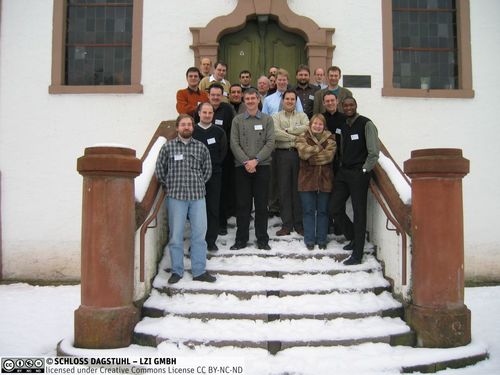Dagstuhl Seminar 04041
Component-Based Modeling and Simulation
( Jan 18 – Jan 23, 2004 )
Permalink
Organizers
- Fernando Barros (University of Coimbra, PT)
- Axel Lehmann (Universität der Bundeswehr - München, DE)
- Peter Liggesmeyer (TU Kaiserslautern, DE)
- Alexander Verbraeck (TU Delft, NL)
- Bernard P. Zeigler (University of Arizona - Tucson, US)
Contact
With respect with a permanent decreasing innovation cycles of increasingly complex distributed systems, and regarding their efficient operation and maintenance, application of quantitative models and simulations is of growing importance
- for systems design and development,
- for configuration planning, and operation and maintenance management and
- for training and education.
Effective model and simulation applications require adaptability and reusability of models and submodels. Therefore, conceptual and methodological approaches for modular, component-based model construction (as opposed to complex monolithic models), and adaptation of model components – based on solid theoretical foundations – is urgently required. The lack of system theoretic foundations for component-based modeling and simulation, and missing international standards, as well, currently results in the implementation of proprietary models, model „components“ and „component“ interfaces, allowing only limited interoperability and reusability of those modules.
Regarding the above mentioned trends and requirements major topics of this Dagstuhl-Seminar will focus on:
- System theoretic definitions and foundations for model-components (especially regarding differences to definitions and specifications of software-components),
- Specification of model components (and interfaces),
- Hierarchical, component-based model development regarding cost-benefit, quality, performance, reliability, and reusability aspects,
- Architectures for component-based model and simulation applications,
- Verification and validation methods for model components,
- Synergies for the application of software-component-technologies in their application for building model-components.
- Fernando Barros (University of Coimbra, PT) [dblp]
- Rachid El Abdouni Khayari (Universität der Bundeswehr - München, DE)
- Steffen Großmann (Fernmeldeschule des Heeres - Feldafing, DE)
- Maritta Heisel (Universität Duisburg-Essen, DE) [dblp]
- Günter Herrmann (Universität der Bundeswehr - München, DE)
- Jan Himmelspach (Universität Rostock, DE)
- Marko Hofmann (Universität der Bundeswehr - München, DE)
- Bernhard Kaiser (Hasso-Plattner-Institut - Potsdam, DE) [dblp]
- Eugene Kindler (Charles University - Prague, CZ)
- Franziska Klügl (Universität Würzburg, DE) [dblp]
- Johannes Lüthi (FHS Kufstein Tirol, AT)
- Andreas Polze (Hasso-Plattner-Institut - Potsdam, DE) [dblp]
- Roberto Rudloff (Universität Magdeburg, DE)
- Thomas Santen (TU Berlin, DE) [dblp]
- Steffen Straßburger (Fraunhofer Institut - Magdeburg, DE)
- Michael Syrjakow (KIT - Karlsruher Institut für Technologie, DE)
- Mamadou Kaba Traoré (University Blaise Pascal - Aubiere, FR)
- Klaus Turowski (Universität Augsburg, DE)
- Adelinde M. Uhrmacher (Universität Rostock, DE) [dblp]
- Edwin Valentin (TU Delft, NL)
- Alexander Verbraeck (TU Delft, NL)
- Gabriel A. Wainer (Carleton University - Ottawa, CA) [dblp]
- Thomas Wiedemann (HTW Dresden, DE)


